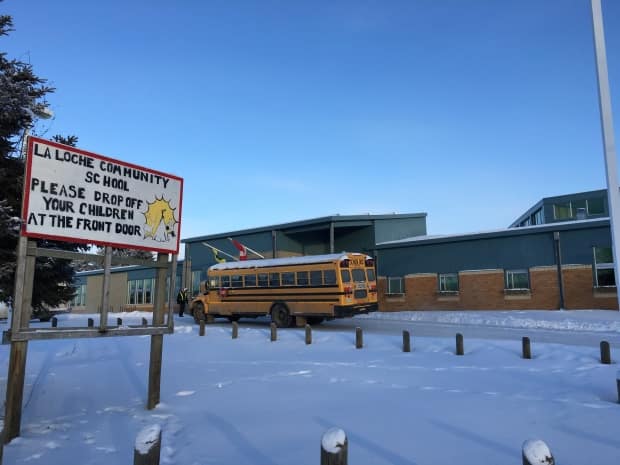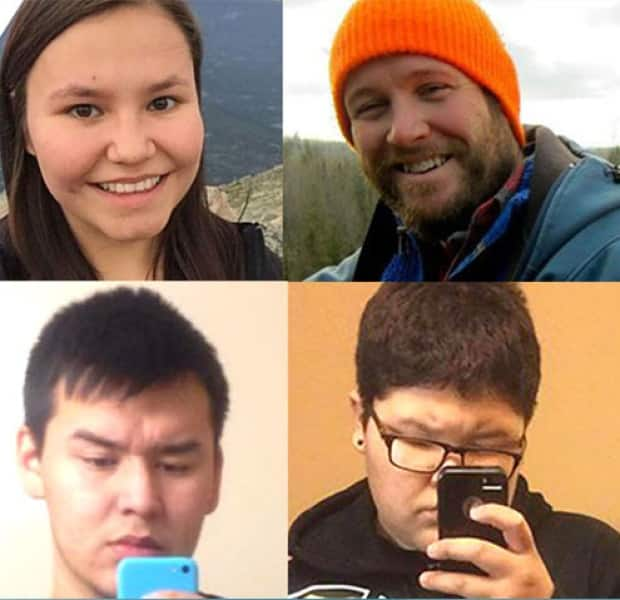'We are resilient': La Loche reflects on 5th anniversary of mass shooting

Five years after four people were killed and seven others injured in La Loche, the northern Saskatchewan community continues to heal.
On Friday, La Loche will mark the milestone anniversary of the Jan. 22, 2016, shootings at a home in the community and Dene High School.
The day also brings anguish knowing more milestone anniversaries will come — 10 years, then 20.
"It's very important to emphasize that healing is occurring for many in the community. But when we are reminded by an anniversary it makes it a little bit more challenging," La Loche Mayor Georgina Jolibois said.
"It's a difficult time always, and maybe it will be different in the years to come. But it is a heavy day, a heavy week and a heavy month."

On the afternoon of Jan. 22, 2016, a then-17-year-old gunman killed his two cousins at a home in the community, and then went to the school, where he fatally shot two more people and injured seven others.
The community will commemorate the four people who died — brothers Dayne and Drayden Fontaine, and educators Adam Wood and Marie Janvier — and the seven injured by hosting a virtual prayer Friday afternoon.

Meals delivered to 500 members of the community will follow, and in the evening a virtual gospel concert will be broadcast by a local radio station.
Students at Dene High School helped put together a memorial video to mark the occasion, with dignitaries, including Prime Minister Justin Trudeau, sharing messages of hope.
In the video, Trudeau calls the shooting a "senseless moment of violence" that changed lives forever, and "the kind of tragedy no one should ever go through."
"Even from afar I stand with you, and I mourn with you," Trudeau said, vowing to offer financial assistance.
Finding the right supports for students
In the five years since, the community has evolved and persevered.
"It's a journey. Everyone heals at their own pace, but I can say we have made improvements at the school level," said Donna Janvier, principal of Dene High School.
Mental health services have been added to Dene High School, and a physician routinely visits to provide health care to students.
WATCH | A February 2016 report on the shooting in La Loche a month earlier:
A modular farm has been donated so students can plant, grow and harvest fresh produce for the school's breakfast and lunch program.
An outdoor school program was introduced, and is now in its third year, and is helping students to connect with nature, their elders and cultural practices, Janvier said.
"It is crucial. It is our identity. It is who we are," she said.
"Integrating that into our everyday learning and curriculum is very important because as students, as a community, we need to remember who we are."
Janvier says changes have been positive, as students once again feel safe coming to school. Educators continue to put a focus on making them feel valued, important and listened to, she said.
Coping with grief, loss during a pandemic
But grieving within the community has become more difficult during the pandemic, as people are isolated.
COVID-19 has put a strain on public health resources, and with the restructuring of services, it's hard for many to access mental health support.
Therapy sessions have moved online, but those who don't have internet access can't get the help.
"We need more resources to work with residents. That is a worrying thought, not only for myself, but for others as well," Jolibois said. "It gets down to taking one day at a time."
WATCH | A 2016 report on how La Loche is trying to heal:
For Janvier, the hardest part of dealing with the aftermath of the shooting has been to lead.
"Many of my students, and many of my staff members grieve differently, heal differently, and I need to be conscious of that," Janvier said.
"I know a lot of educators probably feel this way, but as an educator you really want to fix something, and you know you can't, and that is the frustrating part."
Five years later, the community continues to celebrate its small successes while continuing its healing journey.
"We are resilient. We can move forward," said Janvier.
"We need to remember Jan. 22, 2016, and how our lives have changed since then," she said.
"And every year, we will remember. We will remember the deceased. We will remember the injured. We will remember the survivors."

